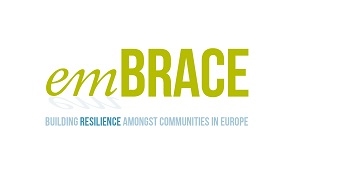Building Resilience Amongst Communities in Europe (emBRACE)

The emBRACE project
The aims of the emBRACE project were to improve the framing of resilience in the context of disasters in Europe, and develop a conceptual and methodological approach to clarify how the resilience capacity of a society confronted with natural hazards and disasters can be characterized, defined and measured.
The framework was tested and ground truthed by means of 6 well-chosen case studies across Europe exposed to different natural hazards, situated in different governance settings and socio-demographic-economic contexts.
emBRACE advanced the methodologies for evaluating, modeling and assessing resilience of different actors. emBRACE will be methodologically rich, drawing on partner expertise across the research methods spectrum.
Stakeholders and experts were incorporated into knowledge-sharing groups. A key difference in emBRACE was the seeking out of people and groups not normally included in such fora; not as subjects of research but as partners in research and experts in their own right.
The emBRACE project started on 1 October 2011 and ended on 30 September 2015.
Part of the legacy of the project is the DISASTER-RESILIENCE discussion list https://www.jiscmail.ac.uk/cgi-bin/webadmin?A0=DISASTER-RESILIENCE which was launched on 13 October 2011, the International Day of Disaster Reduction http://www.unisdr.org/2011/iddr/
Project outputs
All of the outputs from the emBRACE project can be viewed on the project’s webpage: http://www.embrace-eu.org/
-
Framing Community Disaster Resilience [book]:Written for undergraduate students, postgraduates and researchers of social science, and policymakers, Framing Community Disaster Resilience reveals the most effective approaches to enhancing community resilience (2018).
-
The emBRACE Resilience Handbook:This online Handbook contains the collected key outputs of the emBRACE project. They reflect the development of ideas over the four year period of the project and have not been edited post hoc.
-
emBRACE Teaching and Training Materials:This online resource provides selected teaching and training materials (such as powerpoint slides and links to videos) from the emBRACE project for those studying, researching or working in community disaster resilience.
-
The emBRACE Framework of Community Disaster Resilience: This policy brief explains the framework for conceptualizing community resilience to natural hazardsdeveloped by the emBRACE project.
-
Building Resilience Amongst Communities in Europe (emBRACE): Understanding Community Disaster Resilience [animation]:This animation visualises and explains the key components of the emBRACE framework in a way that illustrates its potential utility as a tool through which organisations responsible for Disaster Risk Reduction and other stakeholders might wish to better understand CDR processes in their own communities.
-
Mapping of social networks as a measure of social resilience of agents [report]
-
Social Learning and Resilience Building in the emBRACE Framework [report]
-
emBRACE highlights: Google Earth Flyover for Northern England
-
Alpine Hazards in South Tyrol, Italy – emBRACE case study [case study report]
-
Floods in Northern England, UK – emBRACE case study [case study report]
This project started on 1 October 2011 and ended on 30 September 2015.
The research leading to these results has received funding from the European Community’s Seventh Framework Programme (FP7/2007-2013) under grant agreement no. 283201
(0) Comments
There is no content